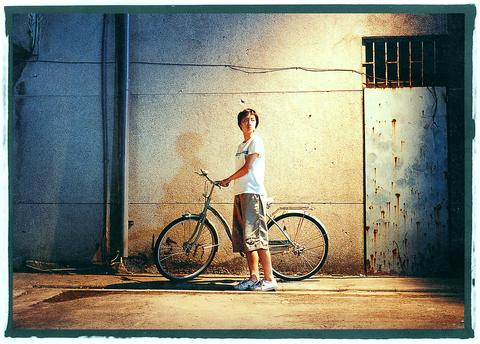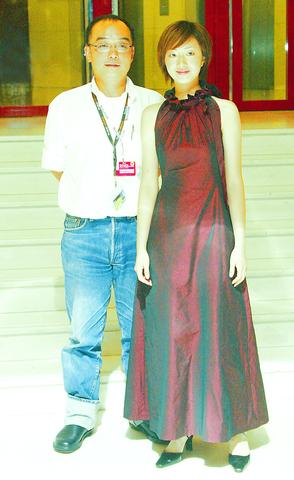Many have cried walking out of the movie theater after watching Taiwanese director Yee Chih-yen's (
Following Tuesday's well-received screening at the Hotel Noga Hilton, the main site of the Director's Fortnight section of this year's Cannes International Film Festival, audience and journalists alike filed into the press conference to fire off a seemingly endless stream of questions about the film. Both Yee and his producer, Peggy Chiao (

PHOTO COURTESY OF ARC LIGHT
French journalists referred to Blue Gate as a "gay" film, a categorization with which Yee took issue. "For me, it's not a film about homosexuality. It's rather a film about young people coping with their problems in life," Yee said.

PHOTO: YU SEN-LUN, TAIPEI TIMES
The film is set in a Taipei City high school and looks at the life of three teens during an unforgettable summer. Guei Lun-mei (
Lin Yue-zhen, played by Liang Shu-hui (
Lin goes to the swimming pool every night to spy on Zhang, who sneaks into the closed swimming pool to practice. She collects the used bottles of mineral water Zhang finishes. She asks Meng, her best friend, to pass a love letter to Zhang."I want to be friends with you," she writes, but the "sunshine boy" becomes attached to the messenger, Meng, and waits around her door.
Zhang, a blithe spirit, is a guileless boy. "I'm Zhang from swimming team and guitar club. I'm not bad!" he always says to Meng. His two dearest wishes are to win the swimming championship and to become Meng's sweetheart. He's unaware of the secret Meng is about to tell him, the secret that might have them taste a melancholy they've never before tasted.
The Blue Gate Crossing is a seemingly simple light story about Taipei's teenagers looking inwards to see their souls.
Yee excels at exploring the intimate world of the main character, Meng -- her troubled self-image and emotionally tumultuous world. She's precocious and knows about loneliness earlier than her classmates. Although she has a nice heart and is friendly to Lin and Zhang, and also a gym teacher who becomes attracted to her, she cannot let them into her world.
"I feel sympathy with the character because I also feel a lot of solitude," Guei said. "It was not that difficult to enter the role. I feel that in reality there must be confused girls like Meng," she said.
Yee perfectly captures the nuances of being a teenager in middle-class Taipei. "We auditioned nearly 4000 teenagers and finally found Guei and Chen from the Hsimenting area last summer," Yee said.
In order to faithfully depict the world of high school, Yee went to school with the students everyday for two weeks. Yee is experienced in dealing with teenage subjects.
Having done several TV dramas about teenagers in previous years, he became a devoted observer of youth in Taipei.
"A lot of stories about teenagers have imposed too much moral judgement on their world. But I want a story from the teenager's point of view. They should find their own right or wrong," Yee said.
This experience being with youngsters made it easy for Yee to direct the three real high school students. "Two crucial parts -- Meng kissing her best friend, and Meng revealing the secret to Chen -- only took one take to shoot. The actors really entered the world of the story," Yee said.
The result revealed in the film is Yee's sharpness and preciseness about the value of being young and how an adolescent mind suddenly becomes an adult mind. This sharpness also gives weight and a certain melancholy to the film's conclusion.
"The blue gate is a symbol for me in the film. It's an image of the future. Everyone has a blue gate in their hearts," Yee said. "As for the melancholy, it's probably me. It's just how I think," he said.

Towering high above Taiwan’s capital city at 508 meters, Taipei 101 dominates the skyline. The earthquake-proof skyscraper of steel and glass has captured the imagination of professional rock climber Alex Honnold for more than a decade. Tomorrow morning, he will climb it in his signature free solo style — without ropes or protective equipment. And Netflix will broadcast it — live. The event’s announcement has drawn both excitement and trepidation, as well as some concerns over the ethical implications of attempting such a high-risk endeavor on live broadcast. Many have questioned Honnold’s desire to continues his free-solo climbs now that he’s a

As Taiwan’s second most populous city, Taichung looms large in the electoral map. Taiwanese political commentators describe it — along with neighboring Changhua County — as Taiwan’s “swing states” (搖擺州), which is a curious direct borrowing from American election terminology. In the early post-Martial Law era, Taichung was referred to as a “desert of democracy” because while the Democratic Progressive Party (DPP) was winning elections in the north and south, Taichung remained staunchly loyal to the Chinese Nationalist Party (KMT). That changed over time, but in both Changhua and Taichung, the DPP still suffers from a “one-term curse,” with the

Lines between cop and criminal get murky in Joe Carnahan’s The Rip, a crime thriller set across one foggy Miami night, starring Matt Damon and Ben Affleck. Damon and Affleck, of course, are so closely associated with Boston — most recently they produced the 2024 heist movie The Instigators there — that a detour to South Florida puts them, a little awkwardly, in an entirely different movie landscape. This is Miami Vice territory or Elmore Leonard Land, not Southie or The Town. In The Rip, they play Miami narcotics officers who come upon a cartel stash house that Lt. Dane Dumars (Damon)

Jan. 26 to Feb. 1 Nearly 90 years after it was last recorded, the Basay language was taught in a classroom for the first time in September last year. Over the following three months, students learned its sounds along with the customs and folktales of the Ketagalan people, who once spoke it across northern Taiwan. Although each Ketagalan settlement had its own language, Basay functioned as a common trade language. By the late 19th century, it had largely fallen out of daily use as speakers shifted to Hoklo (commonly known as Taiwanese), surviving only in fragments remembered by the elderly. In